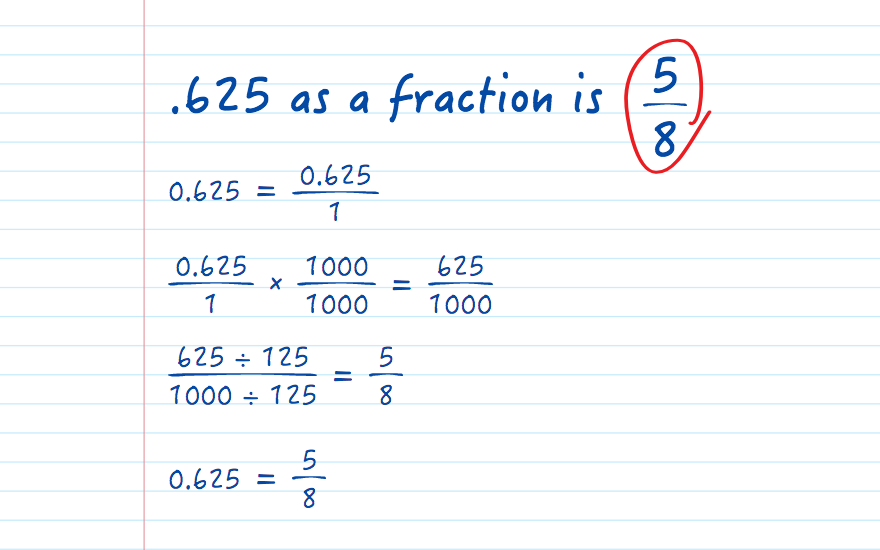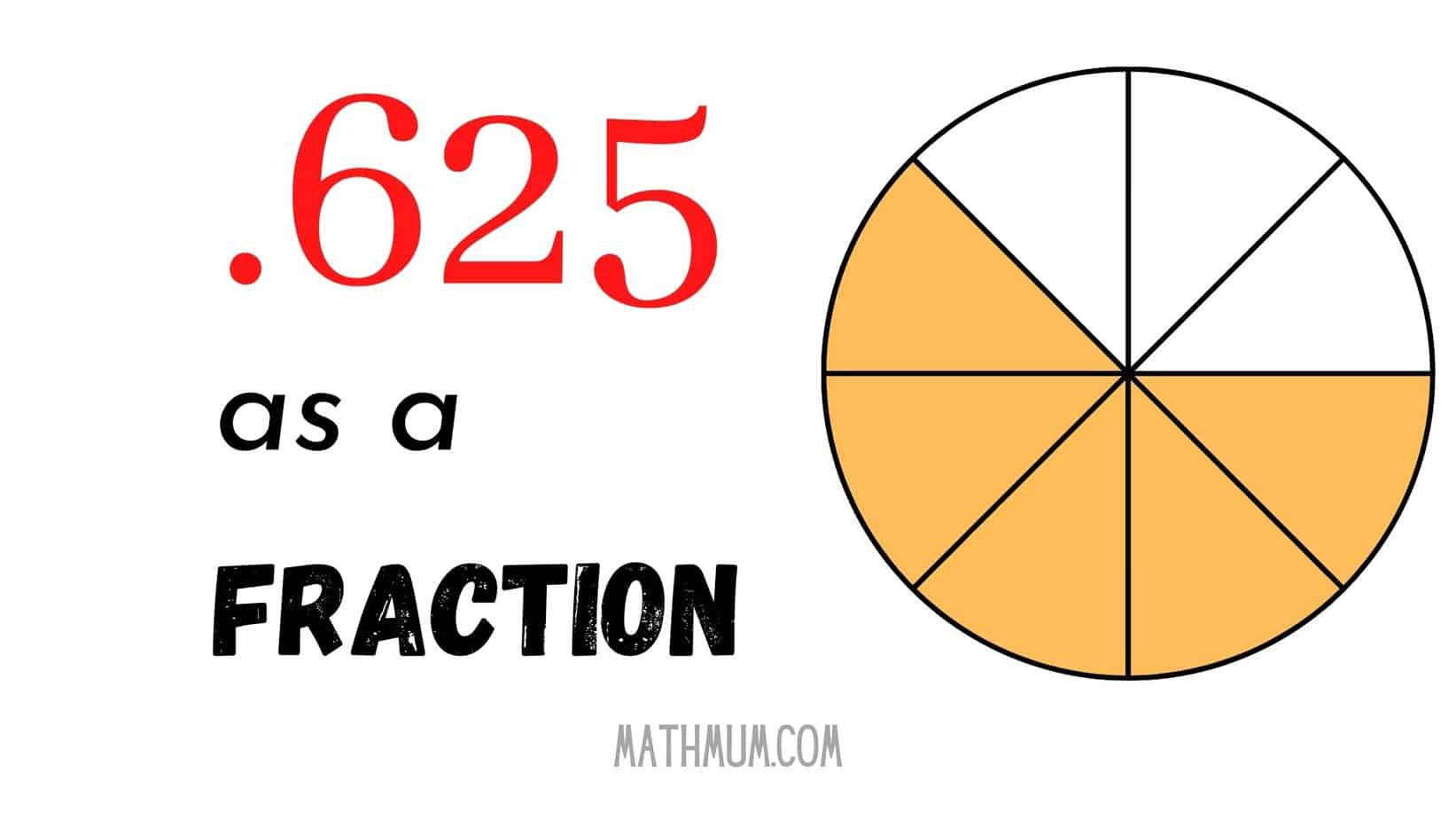Have you ever wondered how decimals like .625 can be expressed as fractions? Understanding decimals and fractions is crucial in mathematics, especially when dealing with real-life applications such as measurements, finance, and engineering. In this article, we will explore the concept of .625 as a fraction, its significance, and how to convert it step by step.
Decimals and fractions are two fundamental ways of representing numbers. While decimals are more commonly used in everyday life, fractions provide a precise and clear representation of parts of a whole. Knowing how to convert between the two is essential for anyone who works with numbers regularly.
This article will delve deep into the world of fractions, specifically focusing on .625. By the end of this guide, you'll have a thorough understanding of how to convert .625 into a fraction, the significance of this conversion, and practical applications in various fields. Let's get started!
Read also:Discovering Dez Bryant Full Name The Journey Of A Legendary Nfl Star
Table of Contents
- What is a Fraction?
- Converting Decimals to Fractions
- Understanding .625 as a Fraction
- Simplifying the Fraction
- Real-World Applications
- Common Fractions Related to .625
- Tips for Converting Decimals to Fractions
- Frequently Asked Questions
- Conclusion
What is a Fraction?
A fraction represents a part of a whole or, more generally, any number of equal parts. When spoken in everyday English, a fraction describes how many parts of a certain size there are, for example, one-half, eight-fifths, three-quarters.
Every fraction consists of two parts: the numerator and the denominator. The numerator represents the number of equal parts, while the denominator indicates how many of those parts make up a whole.
Converting Decimals to Fractions
Converting decimals to fractions is a fundamental skill in mathematics. It involves expressing a decimal number as a fraction in its simplest form. Let's explore the process in more detail.
Step-by-Step Guide
Here's how you can convert a decimal like .625 into a fraction:
- Step 1: Write down the decimal as a fraction with 1 as the denominator. For .625, it becomes 0.625/1.
- Step 2: Eliminate the decimal by multiplying both the numerator and denominator by 10 for every digit after the decimal point. Since .625 has three digits after the decimal, multiply by 1000.
- Step 3: Simplify the fraction to its lowest terms by dividing both the numerator and denominator by their greatest common divisor (GCD).
Understanding .625 as a Fraction
.625 is a decimal that can be easily converted into a fraction. As we've seen in the previous section, the process involves writing it as a fraction and simplifying it. When converted, .625 becomes 5/8.
This fraction represents five parts out of eight equal parts of a whole. It's a simple yet powerful way of expressing the same value in a different format.
Read also:Rohan Marley Music Activism And Legacy
Simplifying the Fraction
Simplifying fractions is essential to ensure they are in their lowest terms. For .625, after converting it to 625/1000, the greatest common divisor (GCD) of 625 and 1000 is 125. Dividing both by 125 gives us the simplified fraction 5/8.
Simplification not only makes fractions easier to understand but also facilitates further calculations and comparisons.
Real-World Applications
Fractions, including .625, have numerous applications in real life. Let's explore some of them.
In Measurements
In the field of measurements, fractions are commonly used in carpentry, construction, and engineering. For instance, when measuring the length of a piece of wood, you might encounter fractions like 5/8 inch, which is equivalent to .625 inches.
In Finance
Financial calculations often involve fractions. For example, when calculating interest rates or dividing assets, fractions provide a precise way of representing parts of a whole. Understanding how to convert decimals like .625 into fractions is crucial in these scenarios.
Common Fractions Related to .625
Here are some fractions closely related to .625:
- 1/2 = 0.5
- 3/4 = 0.75
- 7/8 = 0.875
These fractions are frequently used in various contexts and can be easily converted between decimal and fraction forms.
Tips for Converting Decimals to Fractions
Here are some tips to help you convert decimals to fractions more effectively:
- Practice Regularly: The more you practice, the better you'll become at converting decimals to fractions.
- Use Online Tools: There are numerous online calculators and tools available to assist with conversions.
- Understand the Basics: Make sure you have a solid understanding of fractions, decimals, and their relationship.
Frequently Asked Questions
Here are some common questions about converting .625 to a fraction:
- Q: Why is it important to convert decimals to fractions?
- Q: Can all decimals be converted to fractions?
A: Converting decimals to fractions allows for more precise calculations and better understanding in certain contexts, such as measurements and finance.
A: Most decimals can be converted to fractions, but some, like irrational numbers (e.g., π), cannot be expressed as exact fractions.
Conclusion
Understanding how to convert .625 into a fraction is a valuable skill that can be applied in various real-world scenarios. By following the steps outlined in this article, you can easily convert decimals to fractions and simplify them to their lowest terms.
We encourage you to practice these skills regularly and explore more about fractions and decimals. If you have any questions or need further clarification, feel free to leave a comment below. Don't forget to share this article with others who might find it helpful!


